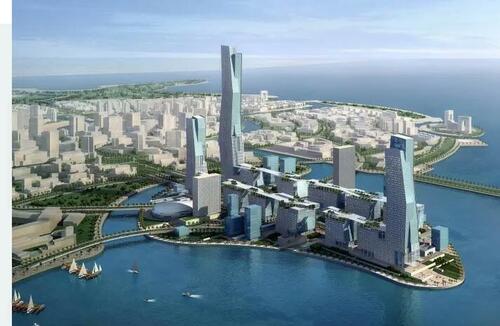
By Felicity Bradstock of OilPrice.com
Earlier this year, Saudi Arabia announced plans to dedicate an $80 billion fund to develop the Neom megaproject, aimed at establishing a futuristic living space in the northwest of the country. This forms part of Saudi Arabia’s Vision 2030, which aims to diversify the national economy and make the country less reliant on its oil revenues. Saudi Arabia plans to develop Neom as a mega clean-energy city on a plot of land the size of Belgium. The space is expected to eventually become self-sufficient and provide a return on investment of between 13 and 14 percent. It will have no cars, roads, or greenhouse gas emissions and will be powered by 100 percent renewable energy, with 95 percent of the land being preserved for nature.
Bin Salman suggested that funds could increase to up to $106 billion if required, with the state investing most of the funds. Neom is expected to be one of the most complex construction developments in the world. Phase one will require $160 billion in funding, with the additional investment being provided through an initial public offering (IPO).
The much-talked-about Neom project will see the 10 regions developed in the northwest of Saudi Arabia. The most ambitious project is called ‘The Line’, two parallel skyscrapers aimed at housing 9 million people, a 170-kilometre building that juts into the Red Sea but is just 200 metres wide. What it lacks in width it makes up for in height at a staggering 500 metres tall, complete with a mirrored facade. If successful, this structure will be a major feat of engineering. The development will also include Oxagon, an industrial city with a manufacturing hub centred around tech industries, to be built on the sea and the mountainous region of Trojena. Neom will include a residential area, an industrial city, and a mountain tourism destination.
The Saudi Crown Prince, Mohammed bin Salman, said, “The designs revealed today for the city’s vertically layered communities will challenge the traditional flat, horizontal cities and create a model for nature preservation and enhanced human livability. The Line will tackle the challenges facing humanity in urban life today and will shine a light on alternative ways to live.” Foundations for The Line superstructure are already being laid, but many architects are doubtful the building will ever be completed due to the major engineering hurdles. Others question the potential for the project to become net-zero in its lifetime, as pledged by the Saudi government, due to the high carbon emissions expected to be released during its construction. But these criticisms are not dampening Saudi Arabia’s high hopes for the project.
Antoni Vives, chief urban planning officer at Neom, believes the development is, so far, going to plan. Vives stated: “I want to be clear about this — Neom is a complex, bold, and highly ambitious undertaking and is most certainly not an easy one to deliver… “But we are making strong progress, and it’s exciting to see the vision come to life.” The most recent budget for the project has soared to $500 billion, part of Saudi Arabia’s National Transformation Plan in 2016, valued at $1.1 trillion.
The structure is expected to be out of this world, with flying taxis, and a high-speed rail network with an end-to-end transit time of just 20 minutes. Planners also expect to see robotic avatars and holograms in its future. In addition to its ambitions to be a trailblazer in several new technologies, the Saudi government has also put connectivity at the centre of the Neom development. Located on the Red Sea, it is expected to form a major trade hub, with 13 percent of the world’s trade passing through the waters at present. Further, 40 percent of the world’s population currently live within a six-hour flight of the region, making it easily accessible.
In terms of renewable power, ENOWA, a subsidiary company of Neom will be tasked with developing sustainable energy and water systems in the region. The firm will oversee the development of a green hydrogen production plant as well as desalination plants for the provision of sustainable water, according to the Saudi Press Agency. ENOWA will work with ACWA Power and the U.S. chemical company Air Products to develop Neom’s green hydrogen capacity. Neom is expected to be powered entirely by renewable energy once completed. Although the country has been criticised for ‘greenwashing’ by proposing ambitious green energy targets with no clear strategy to achieve them, as well as using its renewable energy successes to distract from its human rights issues.
Saudi Arabia has broken ground on its ambitious Neom development, the first of its kind worldwide, with the potential to provide a prototype for other sustainable megastructures. However, many experts across several industries are questioning whether the superstructure and renewable energy goals are realistic and whether the project will actually come to fruition.
By Felicity Bradstock of OilPrice.com
Earlier this year, Saudi Arabia announced plans to dedicate an $80 billion fund to develop the Neom megaproject, aimed at establishing a futuristic living space in the northwest of the country. This forms part of Saudi Arabia’s Vision 2030, which aims to diversify the national economy and make the country less reliant on its oil revenues. Saudi Arabia plans to develop Neom as a mega clean-energy city on a plot of land the size of Belgium. The space is expected to eventually become self-sufficient and provide a return on investment of between 13 and 14 percent. It will have no cars, roads, or greenhouse gas emissions and will be powered by 100 percent renewable energy, with 95 percent of the land being preserved for nature.
Bin Salman suggested that funds could increase to up to $106 billion if required, with the state investing most of the funds. Neom is expected to be one of the most complex construction developments in the world. Phase one will require $160 billion in funding, with the additional investment being provided through an initial public offering (IPO).
The much-talked-about Neom project will see the 10 regions developed in the northwest of Saudi Arabia. The most ambitious project is called ‘The Line’, two parallel skyscrapers aimed at housing 9 million people, a 170-kilometre building that juts into the Red Sea but is just 200 metres wide. What it lacks in width it makes up for in height at a staggering 500 metres tall, complete with a mirrored facade. If successful, this structure will be a major feat of engineering. The development will also include Oxagon, an industrial city with a manufacturing hub centred around tech industries, to be built on the sea and the mountainous region of Trojena. Neom will include a residential area, an industrial city, and a mountain tourism destination.
The Saudi Crown Prince, Mohammed bin Salman, said, “The designs revealed today for the city’s vertically layered communities will challenge the traditional flat, horizontal cities and create a model for nature preservation and enhanced human livability. The Line will tackle the challenges facing humanity in urban life today and will shine a light on alternative ways to live.” Foundations for The Line superstructure are already being laid, but many architects are doubtful the building will ever be completed due to the major engineering hurdles. Others question the potential for the project to become net-zero in its lifetime, as pledged by the Saudi government, due to the high carbon emissions expected to be released during its construction. But these criticisms are not dampening Saudi Arabia’s high hopes for the project.
Antoni Vives, chief urban planning officer at Neom, believes the development is, so far, going to plan. Vives stated: “I want to be clear about this — Neom is a complex, bold, and highly ambitious undertaking and is most certainly not an easy one to deliver… “But we are making strong progress, and it’s exciting to see the vision come to life.” The most recent budget for the project has soared to $500 billion, part of Saudi Arabia’s National Transformation Plan in 2016, valued at $1.1 trillion.
The structure is expected to be out of this world, with flying taxis, and a high-speed rail network with an end-to-end transit time of just 20 minutes. Planners also expect to see robotic avatars and holograms in its future. In addition to its ambitions to be a trailblazer in several new technologies, the Saudi government has also put connectivity at the centre of the Neom development. Located on the Red Sea, it is expected to form a major trade hub, with 13 percent of the world’s trade passing through the waters at present. Further, 40 percent of the world’s population currently live within a six-hour flight of the region, making it easily accessible.
In terms of renewable power, ENOWA, a subsidiary company of Neom will be tasked with developing sustainable energy and water systems in the region. The firm will oversee the development of a green hydrogen production plant as well as desalination plants for the provision of sustainable water, according to the Saudi Press Agency. ENOWA will work with ACWA Power and the U.S. chemical company Air Products to develop Neom’s green hydrogen capacity. Neom is expected to be powered entirely by renewable energy once completed. Although the country has been criticised for ‘greenwashing’ by proposing ambitious green energy targets with no clear strategy to achieve them, as well as using its renewable energy successes to distract from its human rights issues.
Saudi Arabia has broken ground on its ambitious Neom development, the first of its kind worldwide, with the potential to provide a prototype for other sustainable megastructures. However, many experts across several industries are questioning whether the superstructure and renewable energy goals are realistic and whether the project will actually come to fruition.







